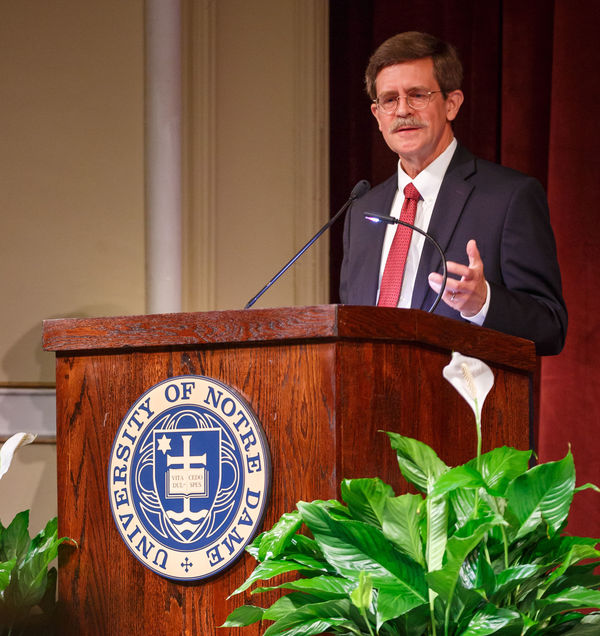On Saturday, July 25, 2015, the University of Notre Dame’s Master of Science in Global Health program held its 4th Commencement Exercise, graduating 28 students with the professional degree of Master of Science in Global Heath.
The 2015 Commencement speaker, Dr. David Addiss, whose career has spanned many health disciplines with global impact, gave a thought provoking and inspiring send off to the graduates. Addiss currently holds the position of Director at Children Without Worms at the Task Force for Global Health in Decatur, Georgia, and is the founder and director of the Center for Compassion & Global Health also headquartered in Decatur. His career includes 20 years with the Centers for Disease Control and Prevention in Atlanta where he co-founded the World Health Organization’s Collaborating Center for Control and Elimination of Lymphatic Filariasis in the Americas. Two decades later the elimination program is well on its way to addressing the 1.2 billion people in over 73 countries around the world who are at risk of lymphatic filariasis.

“Dr. Addiss gave a heartfelt message to our graduates about the history of global health, where we are today and how far we have to go,” states Katherine Taylor, Associate Director of the Eck Institute for Global Health and Director of Global Health Training. “It was an important message from this pioneer who helped shape the field of what is now known as global health. His deep, spiritual, conviction and vast breadth of experience made for a moving commencement address regarding the healing of both mind and spirit in a field that is rarely addressed, but desperately needed.”
The Center for Compassion & Global Health has been a partner with the Notre Dame Master of Science in Global Health program for the last year. Under the research advisement of Dr. Addiss, Ariel Arguelles MS ’15, was in Haiti for the summer researching the evaluation of the role of compassion in global health: A case study of deworming campaigns in Leogane, Haiti. Arguelles is going on to a doctoral program at the University of Texas, Dallas. She is well prepared for her research to truly make a difference in the lives of those afflicted with some of the most devastating diseases known to humans. The future of global health needs to have a compassion component, and Dr. Addiss is leading that charge guiding students like Arguelles.
Addiss began his commencement address by saying, “global health provides not just an opportunity to do good in the world on a large scale, but also an opportunity for continued inner growth and development.” Addiss outlined his thoughts on the definition of global health by stating: Global health is a notion, an idea rooted in the connectedness of life; an objective, a goal to take action and attain; an academic discipline where we study health equity and the global implications thereof; a system with a structure that serves humanity; and lastly, a manifestation of compassion dedicated to reliving suffering on a massive scale." Addiss further states, “Global Health is rooted in the value of compassion. It is grounded in an awareness of our interconnectedness and a concern with the whole. Global health and compassion both seek to build bridges between people who are separated by geography, politics, resources, and other factors.”
Addiss made note of leaders in global health including Mother Theresa, Peter Brown from Emory University, and Paul Farmer, founder of Partners in Health. He also included Notre Dame’s own Fr. Gustavo Gutierrez, O.P., Ph.D., the John Cardinal O’Hara Professor of Theology, and Fr. Donald McNeill, C.S.C., Ph.D., founder of Notre Dame’s Center for Social Concerns, both of whom are notable, well-published pioneers in the field.
On the Friday before the Saturday Commencement Exercises, Addiss spent time in a round table discussion with leaders across campus on the subject of compassion and global health. Included was Fr. Don McNeil, CSC. “I was inspired and encouraged by this generative conversation,” says Addiss after meeting with McNeil. “And I was deeply impressed by the innovative, rigorous scholarship by Notre Dame faculty into the core human and spiritual values that lie at the foundation of global health, business ethics, international development, peacebuilding, medicine, nursing, and others disciplines.”
Notre Dame’s Master of Science in Global Health program is 12-month, science-centric academic program that arms students with the knowledge, tools, and experience to be part of the solution to the global health crisis. The rigorous curriculum includes classroom training and experiential learning to prepare students for improving human health around the world, especially in poor and underserved people.
After two semesters of coursework on campus, students complete a six- to eight-week field experience abroad in a resource-poor location. Upon their return from their international immersion, each student submits and presents a capstone project. This scholarly report includes original or literature based research written by which they connect classroom science-centric training, survey research, and mathematical modeling to the field via hands-on experience.
The Eck Institute for Global Health is a university-wide enterprise that recognizes health as a fundamental human right and endeavors to promote research, training, service to advance health standards for all people, especially people in low and middle-income countries, who are disproportionately impacted by preventable diseases. For more information about Notre Dame’s Master of Science in Global Health degree program, visit: here